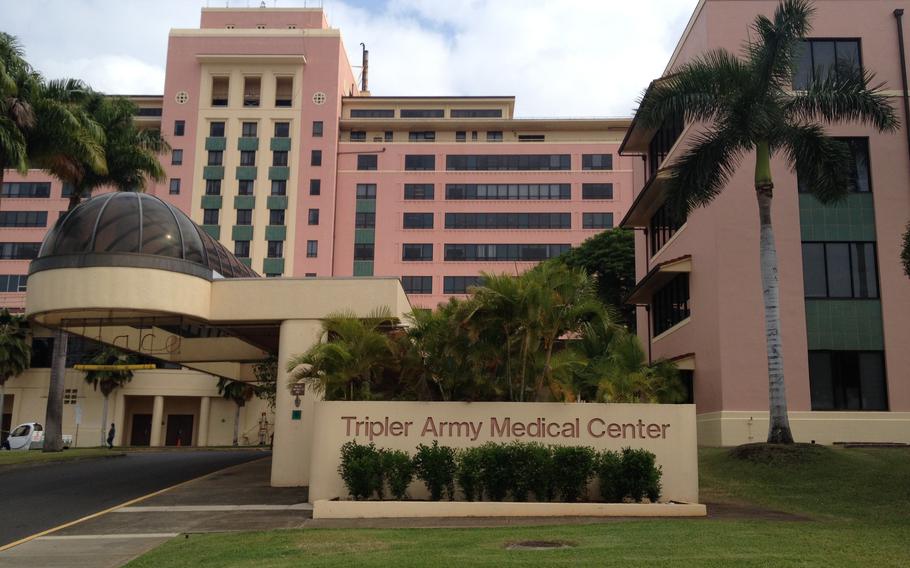
Hawaii’s U.S. District Court on Tuesday awarded $29.5 million to a local military family in the largest medical malpractice judgment against Tripler Army Medical Center for a 2016 incident involving their then-month-old child. (Tripler Army Medical Center)
HONOLULU (Tribune News Service) — Hawaii’s U.S. District Court on Tuesday awarded $29.5 million to a local military family in the largest medical malpractice judgment against Tripler Army Medical Center for a 2016 incident involving their then-month-old child.
In September 2016, John and Laura Warren rushed their daughter to Tripler when their baby’s belly became distended and tight, and she turned blue from the bellybutton down. Shortly after arriving at the hospital, she stopped breathing and had to be resuscitated.
“They told me a lot of things, but there’s a lot of things they didn’t tell me,“ John Warren said.
Some staff at the hospital suspected she was suffering from a midgut volvulus, a condition occurring in infants where the intestine twists, causing a loss of blood flow. It’s a serious condition in infants that can lead to death or significant and permanent medical complications if it’s not immediately treated. The child did have a volvulus. But doctors didn’t check.
“Instead, they waited 19 hours,“ said Loretta Sheehan, one of the attorneys who represented the Warrens. “And then when she was near death, they sent her by ambulance over to Kapiolani Medical Center. ... They found that about 90 to 95% of her small intestine was dead, ‘necrotic’ was the word they used, so they spent the next five months in the hospital. She had a total of about 14 surgeries.”
The girl survived, but the delay meant she lost most of her intestines. She now requires supplemental nutrition and medication given to her through tubes going into permanent “ports,“ or holes, in her body. Over time those ports became infected and she suffered brain and heart damage.
“The only way she can survive is by receiving nutrition and fluids through tubes that enter her blood vessels and her blood vessels right below her collarbone and also a tube that enters her stomach. ... Her care is 24 /7 and it’s going to be this way for the rest of her life,“ said Sheehan. “This award will permit my client to survive. Her medication is extremely expensive, her care is extremely expensive. And she’s going to require a great deal of help in the future.”
A spokesperson for Tripler declined to comment on the case or if the handling of the child’s care led to any policy changes at the hospital, referring questions to the U.S. Justice Department.
The case is the latest in a series of malpractice cases Tripler has faced. Last year the government agreed to pay a $15 million settlement for a baby who suffered brain damage during birth at Tripler due to a delayed cesarean section. Settlements and verdicts against Tripler since 1997 have cost as much as $108 million. Some former patients have derisively nicknamed the hospital “Cripler.”
“They gotta get better,“ Warren said. “For all their advertising as being the biggest hospital in the Pacific, they really glorify themselves.”
Warren is a combat veteran who served in Afghanistan and currently works as a carpenter. He said he was devoted to the Army, but that while he said fellow soldiers and his leadership were supportive, he said Tripler’s handling of his daughter’s care felt like a betrayal. Ultimately, he said caring for his daughter forced him to hang up his uniform and leave the Army.
“Originally when she was in the hospital, they gave me orders to leave to different places,“ he said. “But with her medical condition, even at the time, she was still in the hospital.”
Warren said that he tries to keep a positive and optimistic outlook for his daughter, but he knows there will be significant challenges ahead.
“Honestly it’s day to day,“ he said. “Whatever she needs, we do it.”
“The malpractice in this case was egregious,“ Sheehan said. “It doesn’t make any sense at all. When you look at a baby and you know she might have a condition that will kill her, to sit and wait and see if it kills her ... I’m relieved that the court found liability. And I’m grateful that the court understood the amount of money it’s going to take to care for this child.”
(c)2023 The Honolulu Star-Advertiser
Visit at www.staradvertiser.com
Distributed by Tribune Content Agency, LLC.